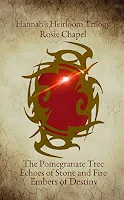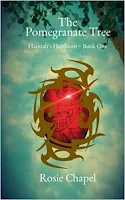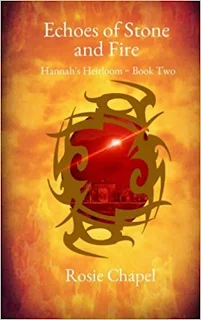"Hannah's Heirloom Trilogy" by Rosie Chapel – A Double Life 2000 Years Apart
The Rosie Chapel History Tour
Time travel is a concept that has been approached from many different angles by countless authors, each one trying to accomplish something specific, to materialize their concrete view of the concept's realization.
While some like to get down into the details, there are others for whom it's really more of a way to transport the reader into an unfamiliar setting while sticking with a familiar type of character, sometimes even being a stand-in for the audience.
For authors like Rosie Chapel, time travel is more part of the plot than the actual plot itself, at least if we just take a look at the three novels which constitute Hannah's Heirloom trilogy.
Just to give you the lay of the land, they follow the titular heroine as she travels the world in modern times and in each book finds herself transported into the past as a woman she seems inexplicably linked to.
Juggling life between the past and present, she experiences the attack on Herod's Fortress, the eruption of Mount Vesuvius, and life in the badlands of Northumbria... all while trying to further her search for her ancestor's carved pomegranate and feed a blossoming love with her best friend, Max Vallier.
Book 1: The Pomegranate Tree
Without spending too much time on getting started, the book opens as Hannah receives an ancient ruby clasp from her long dead grandmother and decides to embark on a journey to Masada, the jewelry's supposed origin.
Once she arrives in the desert with her best friend Max, she is plagued by strange dreams and visions of the deep past, most notably the zealots' assault on Herod's Fortress in 66AD.
Soon she begins to blur with the past, and eventually ends up transported there, straight into the life of an unmarried Jewish healer. She tends to the soldiers as best she can, doing her best to put her knowledge from the future to good use. The first thing that came to my attention when reading this book is that the author doesn't beat around the bush.
There are never any stale moments in the sense that either we see some character development happening, or events of some significance are taking place.
This gives the book a very pleasant flow that makes this into what most people would call a page turner, something you could probably finish in an evening or two.
The characters are all quite likeable and portrayed as normal humans with understandable motivations rather than cartoonish caricatures.
In addition, it shows that Chapel has greatly studied the history of the times and we get quite the educational tour of Masada and the events that befell the people of those times.
The descriptions were quite vivid and evocative, and i believe the author ultimately accomplishes her goal of transporting us back into ancient times and making us forget about the present for just a little bit.
While for me it certainly wasn't the highlight of it all, the romance in this book is fairly well-played out and serves as a welcome interlude to the history lessons.
The Pomegranate Tree is a very worthy start to an interesting trilogy for those of you who can say they are into historical fiction, particularly set in Roman Judea. It's ultimately a pleasant read that will leave you feeling satisfied in every way, whether or not you choose to press onwards.
Book 2: Echoes of Stone and Fire
So as you might imagine, Hannah ultimately manages to make it out alive and back into the present, and eighteen months later goes on a spur of the moment trip to Rome with Max, who is now basically her unofficial husband.
Once again visions begin plaguing her, but she has trouble understanding why since she's quite far from Masada. One thing leads to another, and soon she goes with Max and two friends on an excavation into the ruins of Pompeii, and long story short, she travels back in time once more.
With the knowledge of the doom that is about to befall the time, Hannah has a very short window to convince at least her loved ones to run away from the devastation.
While this book was a bit slower to get started, especially since there are less mysterious elements to play with, I find that it picked up the pace when it needed to and stopped mucking about at all.
Perhaps even more so than in the first book, the stakes actually feel high and deadly, perhaps having something to do with the all-powerful essence of the forces of nature.
The mount really feels like it's about to erupt any day now and the urgency created by the situation lands a feeling of intensity as we see Hannah more or less desperately try and avert an unavoidable doom.
There is a great uncertainty as to how successful she can be in such an unusual undertaking, and it keeps us on our toes from start to finish, eager for the next page.
Once again the work done in terms of research is nothing short of phenomenal as we are presented with a clear and complete picture of people's lives in those ancient times.
While of course we can probably never reproduce it with a hundred percent accuracy, this feels like it comes quite close as we get further and further engrossed into all the beliefs and daily rituals the people were going through.
While the story does shift from the past into the present with a couple more storylines in the latter, it's our time spent in Pompeii that captures the spotlight.
To keep it concise, Echoes of Stone and Fire is just as good as the first book in my eyes, standing as a strong work of historical fiction that takes us into the heart of arguably one of history's most famous events. It can also be read on its own apart from the others, which is always a bit of a bonus when it comes to trilogies in my opinion.
Book 3: Embers of Destiny
After barely escaping herself from the eruption of Mount Vesuvius, Hannah and Maxentius make their way to the troubled frontier of Northern Britannia, still a hotbed of conflict after the recent invasion.
In the modern world, she is now married to Max Vallier and works as an artifact cataloguer for a museum. One day she comes across something some aerial surveys, and one of them leaves her speechless: it's the carved pomegranate of her ancestor that was made after the massacre at Masada.
After yet another disaster strikes, Hannah finds herself travelling back in time once again to the garrison in Northern Britannia, where Maxentius was commander.
With little historical data on this period, Hannah must rely on her own instincts more than anything to survive in a dangerous frontier world where peace is always hanging by a small thread.
This third book in the series pulls in a slightly different direction, in the sense that it isn't really based on a specific historical event that was well-documented.
Instead, Rosie Chapel elects to take a different route, transporting us into a nebulous time where she is more free to use her own imagination as an author rather than her research as a historian... and in my opinion, it works fantastically well.
Her general knowledge of the time is still remarkable and she has no problems weaving together expressive descriptions that paint the days of yore in unforgettable strokes.
As a result, the story itself is much more about the people themselves and it's quite interesting to see how this whole conquest business is managed, and how more often than not, there's no fun to be had for either side.
The twists and turns to the relations between the Romans and the locals are captivating in their own rights and there is even a bit of a detective mystery going on. In terms of entertainment, I'd say that this third book has found a way to surpass its predecessors.
Embers of Destiny is a highly-commendable third volume in the series and I find it remarkable that there wasn't even a hint of quality dropping.
It's even better than the previous books in my opinion, having all of their qualities while carrying an even more absorbing plot.
If historical fiction set during roman times is your thing, then this is a series you can't afford to miss out on.
 | Rosie ChapelPersonal site Rosie Chapel is an English-Australian writer who decided to take to the pen after a long career in finance and customer service. After completing her BA with a double major in Classics & Ancient History and Medieval & Early Modern Studies, she channelled her passion for the written word into fiction, writing amongst others the Hannah's Heirloom trilogy, Love on a Winter's Tide, Of Ruins and Romance and Once Upon an Earl. |












Comments
Post a Comment